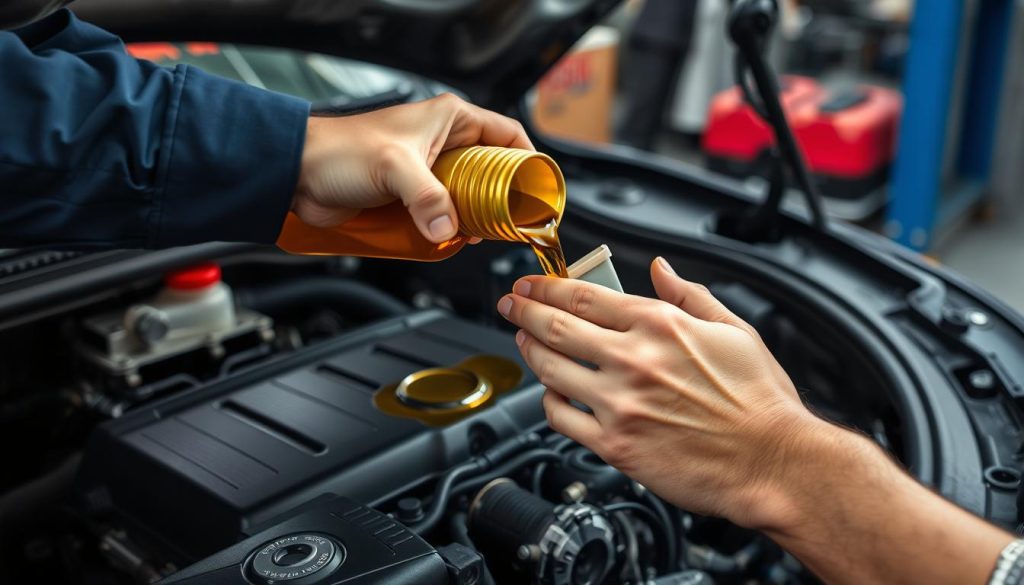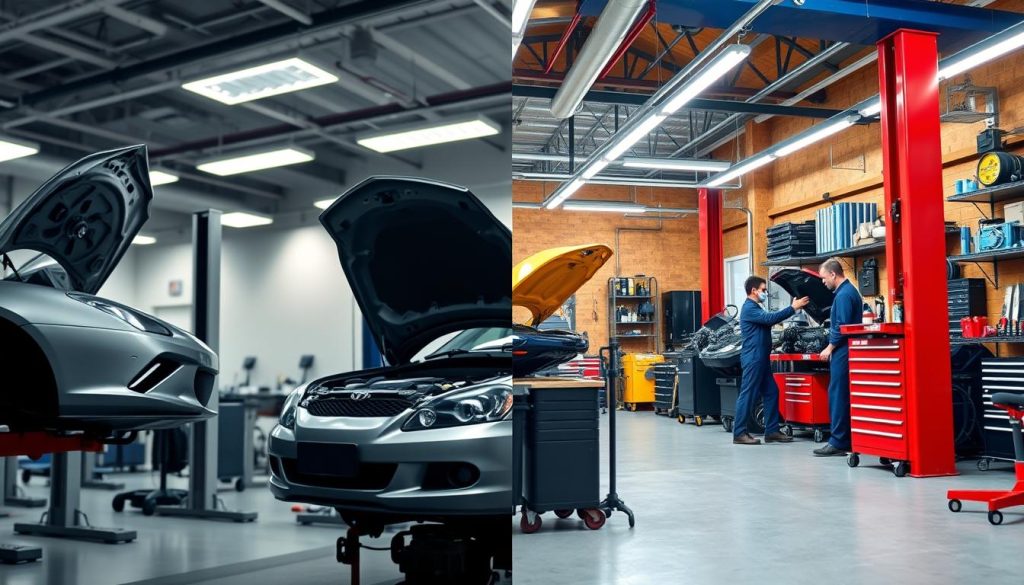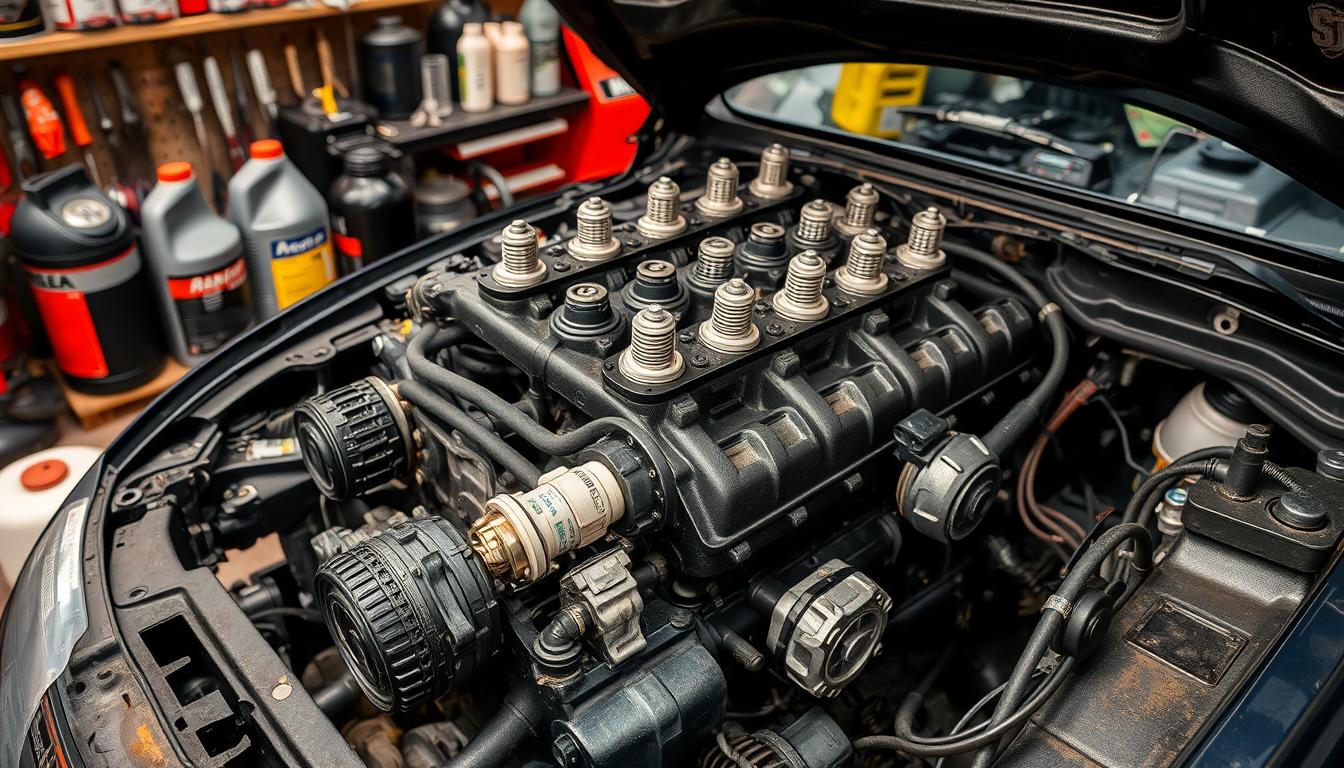Preserving your car’s engine’s peak performance doesn’t necessitate a significant financial outlay. Implementing astute engine maintenance strategies can dramatically lower expenses while ensuring your vehicle operates efficiently. This guide delves into cost-effective engine care techniques that every car owner should be aware of.
From grasping fundamental upkeep to embracing intelligent driving practices, we will examine all facets of vehicle maintenance. Whether you lean towards DIY endeavors or seek professional assistance, these insights will empower you to maintain your engine without depleting your finances.
Key Takeaways
- Regular oil changes are vital for engine longevity
- DIY inspections can identify issues early, saving money
- Proper driving habits minimize wear and tear on your engine
- Comparing service prices aids in finding affordable maintenance
- Investing in quality parts and fluids can prevent costly repairs
- Maintenance schedules ensure your engine remains in optimal condition
Understanding the basics of car engine maintenance
Car engine maintenance is essential for maintaining your vehicle’s performance and preventing costly repairs. Regular maintenance of engine components can extend your car’s lifespan and enhance its performance.
Common engine components that require regular maintenance
Several critical engine components necessitate frequent attention to ensure peak performance. These include:
- Oil and oil filter
- Air filter
- Spark plugs
- Timing belt
- Coolant system
Regular inspections and replacements of these parts can avert significant issues in the future.
Importance of preventive maintenance
Preventive maintenance is fundamental to engine longevity. Addressing issues before they worsen can save both time and money on extensive repairs. This approach involves routine inspections, timely replacements, and following the manufacturer’s service schedules.
Reading warning signs and indicators
Your car communicates possible issues through various warning signs. Being vigilant about these signals can help you address problems promptly:
| Warning Sign | Potential Issue |
|---|---|
| Check Engine Light | Various engine problems |
| Unusual noises | Mechanical failures |
| Decreased fuel efficiency | Engine performance issues |
| Vibrations | Misalignment or worn components |
By grasping these basics, you can better care for your car’s engine and sidestep unnecessary expenses. Remember, consistent upkeep is the cornerstone of a healthy, enduring vehicle.
Regular oil changes and fluid monitoring
Regular oil changes are essential for maintaining your engine’s health. The frequency of oil changes varies by vehicle make and model, typically between 3,000 to 7,500 miles. Adhering to these intervals ensures your engine remains well-lubricated, preventing harmful buildup.

Monitoring fluid levels is equally critical for engine health. It is imperative to regularly check these key fluids:
- Engine oil
- Coolant
- Transmission fluid
- Brake fluid
- Power steering fluid
Conduct coolant checks when the engine is cold to prevent injury. Low coolant levels can cause overheating, leading to severe engine damage. Always be vigilant for dashboard warning lights indicating low fluid levels.
| Fluid | Check Frequency | Typical Replacement Interval |
|---|---|---|
| Engine Oil | Monthly | Every 3,000-7,500 miles |
| Coolant | Every oil change | Every 30,000-50,000 miles |
| Transmission Fluid | Monthly | Every 30,000-60,000 miles |
By ensuring proper fluid levels and adhering to recommended oil change schedules, you can significantly extend your engine’s lifespan. This proactive approach not only saves you from costly repairs but also enhances the overall performance of your vehicle. Remember, prevention is always more cost-effective than cure when it comes to engine maintenance.
DIY maintenance tasks to save money
Engaging in home car maintenance can dramatically lower your vehicle upkeep expenses. Equipped with the appropriate DIY tools and knowledge, numerous tasks can be managed independently, avoiding substantial financial outlays.
Simple inspections you can perform at home
Regular self-inspection is fundamental in identifying issues promptly. Monthly, verify your oil level, tire pressure, and brake fluid. Inspect for leaks beneath your vehicle and listen for abnormal noises during startup. These straightforward assessments can avert expensive repairs in the future.
Basic tools needed for DIY maintenance
Every home mechanic necessitates a fundamental set of DIY tools. Begin with a socket set, screwdrivers, pliers, and a jack. Include a multimeter for electrical tasks and an oil filter wrench for oil changes. Possessing these essentials empowers you to address many routine maintenance duties.
When to attempt repairs yourself vs. seeking professional help
While numerous tasks are amenable to DIY, some necessitate professional intervention. Perform oil changes, air filter replacements, and battery maintenance yourself. For complex engine work, transmission issues, or any safety system repairs, professional assistance is advisable. Always err on the side of caution and seek expert advice if in doubt, to prevent costly errors.
- DIY: Oil changes, air filter replacement, battery maintenance
- Professional: Engine rebuilds, transmission work, safety system repairs
By honing basic home car maintenance skills and discerning when to seek professional assistance, you can significantly reduce expenses. This approach ensures your vehicle remains in optimal condition for extended periods.
Finding reliable and affordable car engine services
When your car requires engine work, selecting the appropriate service provider is essential. We will examine strategies for securing top-notch, yet budget-friendly, auto services.
Comparing Service Center Prices
Initiate by soliciting quotes from various service centers. Prices differ significantly, necessitating thorough comparison. Many establishments offer complimentary estimates, facilitating the comparison of costs for identical services.

Independent Mechanics vs. Dealerships
The decision between independent mechanics and dealerships is a common conundrum. Independent shops frequently present more competitive pricing and personalized service. In contrast, dealerships, though more expensive, possess brand-specific expertise and utilize original parts.
| Independent Mechanics | Dealerships |
|---|---|
| Lower labor rates | Brand-specific knowledge |
| Flexible parts options | Original equipment parts |
| Personal relationship | Latest diagnostic tools |
Reading Reviews and Getting Recommendations
The significance of service center reviews and personal recommendations cannot be overstated. Online platforms such as Yelp or Google Reviews offer valuable insights into customer experiences. Seeking recommendations from acquaintances can lead to discovering trusted mechanics.
It is important to note that the most affordable option is not always the most beneficial. Strive for a balance between cost and quality when evaluating mechanic services. Through diligent research, you can uncover affordable, dependable engine services to maintain your vehicle’s optimal performance.
Extending car engine lifespan through proper care
Proper care is essential for engine longevity. Adhering to a consistent maintenance schedule ensures your vehicle operates efficiently for extended periods. Regular inspections and timely repairs avert minor problems from escalating into significant expenses.
Long-term care transcends mere oil changes. It encompasses the replacement of filters, the examination of belts and hoses, and the monitoring of fluid levels. These actions significantly enhance engine performance and longevity.
Optimizing performance necessitates the use of premium parts and fluids. While cost-effective alternatives may seem appealing, they often result in increased wear and tear. Adherence to manufacturer guidelines ensures optimal performance.
“An ounce of prevention is worth a pound of cure.”
This adage is profoundly relevant to car engines. Preventive maintenance is significantly less costly than extensive repairs or replacements. Establish a maintenance regimen based on your vehicle’s manual and adhere to it diligently.
| Maintenance Task | Frequency | Impact on Engine Longevity |
|---|---|---|
| Oil Change | Every 3,000-5,000 miles | High |
| Air Filter Replacement | Every 15,000-30,000 miles | Medium |
| Spark Plug Replacement | Every 30,000-100,000 miles | High |
| Timing Belt Replacement | Every 60,000-100,000 miles | Very High |
Driving habits also play a critical role in engine longevity. Avoiding sudden accelerations and harsh braking is advisable. Ensuring your engine warms up before driving, even in cold weather, is another key practice. These habits collectively contribute to a longer engine lifespan.
Smart driving habits that reduce maintenance costs
Adopting smart driving habits can significantly cut down on engine maintenance costs while boosting fuel efficiency. By practicing eco-driving techniques, you’ll not only save money but also extend your vehicle’s lifespan.
Proper warm-up techniques
Engine warm-up is critical for optimal performance. Begin by driving gently for the first few minutes, allowing your engine to reach its ideal operating temperature gradually. This approach reduces wear and tear on engine components.
Avoiding aggressive driving
Aggressive driving habits like rapid acceleration and hard braking can harm your engine and decrease fuel efficiency. Instead, maintain a steady speed and anticipate traffic flow to reduce unnecessary strain on your vehicle.
Optimal speed and RPM ranges
Maintaining optimal speed and RPM ranges is key to effective RPM management. Most engines operate efficiently between 1,500 and 2,500 RPM. Staying within this range helps maximize fuel economy and minimize engine wear.
| Driving Habit | Impact on Maintenance Costs | Fuel Efficiency Improvement |
|---|---|---|
| Gentle acceleration | Reduces engine wear | Up to 20% |
| Maintaining steady speed | Minimizes brake pad wear | Up to 15% |
| Optimal RPM range | Extends engine life | Up to 10% |
By incorporating these eco-driving practices into your daily routine, you’ll notice a significant reduction in maintenance costs and improved fuel efficiency. Remember, smart driving habits benefit both your wallet and the environment.
Using quality parts and fluids
The selection of parts and fluids significantly impacts your vehicle’s performance and lifespan. We will examine the available options and discuss the merits of investing in premium components.
OEM vs. aftermarket parts comparison
OEM parts are manufactured by the vehicle’s manufacturer, ensuring a precise fit and warranty maintenance. Their premium price, though, can be a deterrent. In contrast, aftermarket components, sourced from third-party suppliers, offer a cost-effective alternative. They may enhance performance but vary in quality.
| OEM Parts | Aftermarket Components |
|---|---|
| Perfect fit | May require modifications |
| Maintain warranty | May void warranty |
| Higher cost | Lower cost |
| Consistent quality | Quality varies |
Understanding oil grades and specifications
Oil grades are vital for engine health. The numbers on the oil bottle indicate viscosity at various temperatures. For instance, 5W-30 oil behaves like a 5-weight oil in cold weather and a 30-weight oil in warmer conditions. Always adhere to the viscosity recommended by your vehicle’s manufacturer.
When to invest in premium auto parts
Premium auto parts are justified for high-performance or luxury vehicles. They offer superior longevity and performance compared to standard parts. Premium components are advisable for critical systems such as brakes, suspension, and engine internals. For routine maintenance items like filters or spark plugs, standard options are generally sufficient.
“Quality parts and proper fluids are the lifeblood of your vehicle. Don’t skimp on these essentials if you want your car to run smoothly for years to come.”
Utilizing the correct parts and fluids is essential for maintaining your vehicle’s optimal performance and preventing costly repairs in the future.
Maintenance scheduling and record keeping
Monitoring your car’s maintenance is essential for lowering engine expenses. A meticulously kept maintenance log ensures you adhere to scheduled upkeep. This simple habit can avert expensive repairs in the future. Many car owners leverage digital maintenance tracking apps for streamlined record-keeping.
Service records serve more than just as a memory aid for oil changes. They offer a transparent account of your vehicle’s care. This is highly beneficial when selling your car. Prospective buyers appreciate seeing evidence of consistent maintenance. It bolsters their confidence in the vehicle’s state.
Regardless of your preference for paper or digital, maintaining consistency is critical. Establish reminders for impending services. Store all receipts and notes from mechanic visits. Adopting a detailed approach to maintenance scheduling will yield significant benefits. It enables the early detection of minor issues, preventing them from escalating into major problems. Your financial well-being will appreciate this effort in the long term.

Leave a Reply